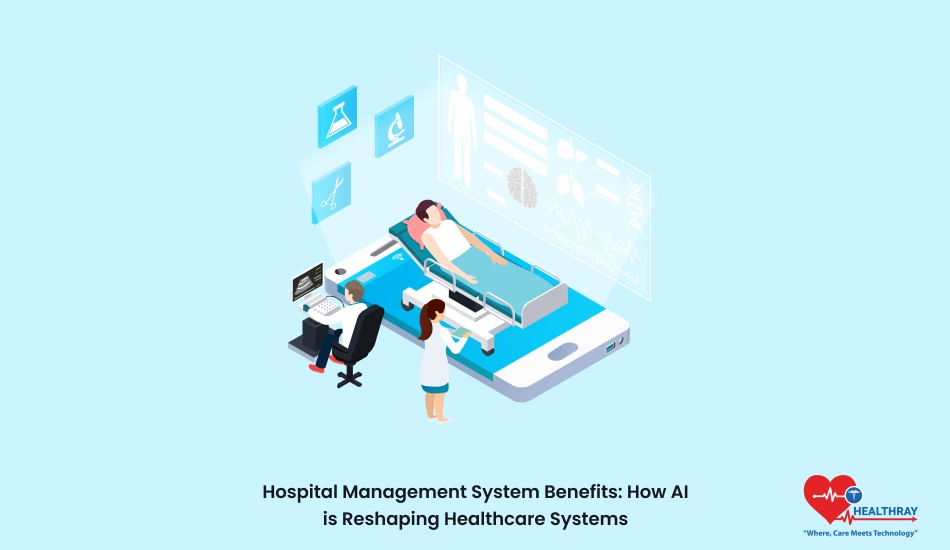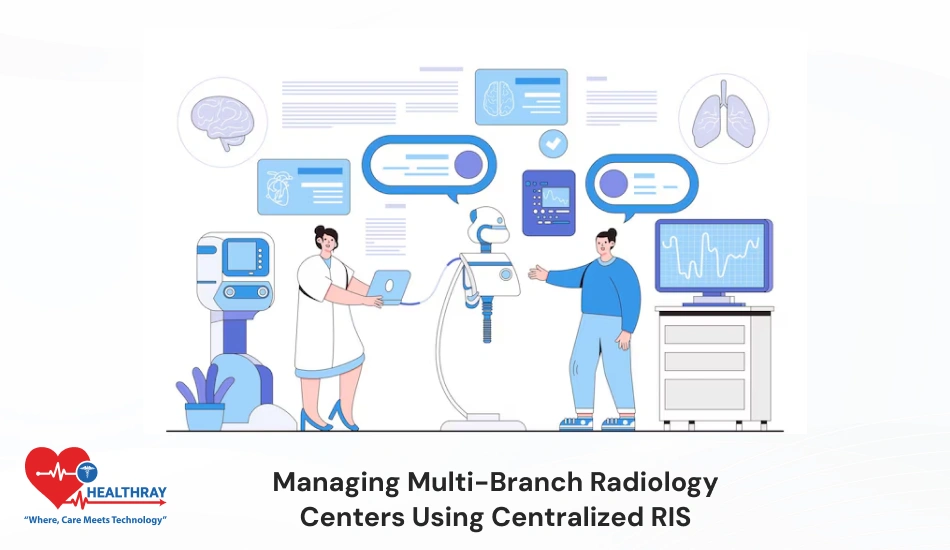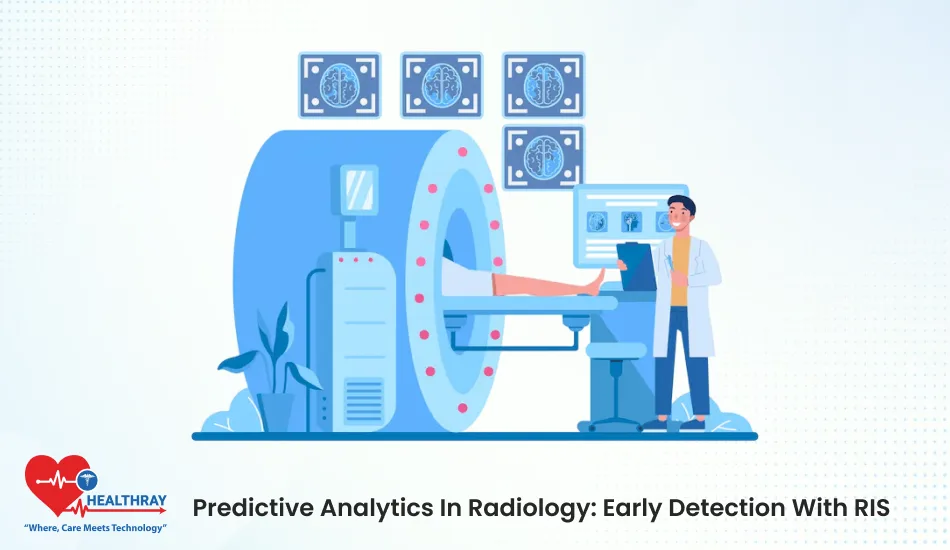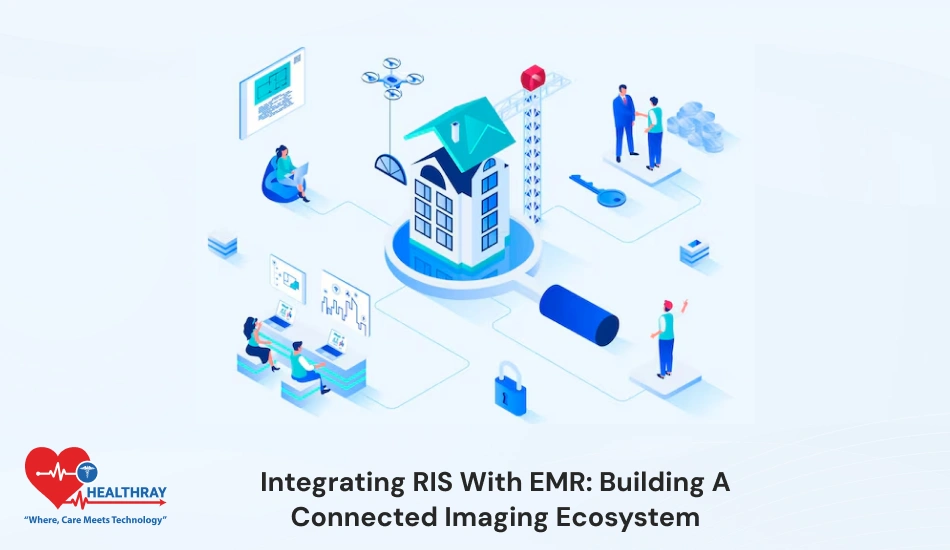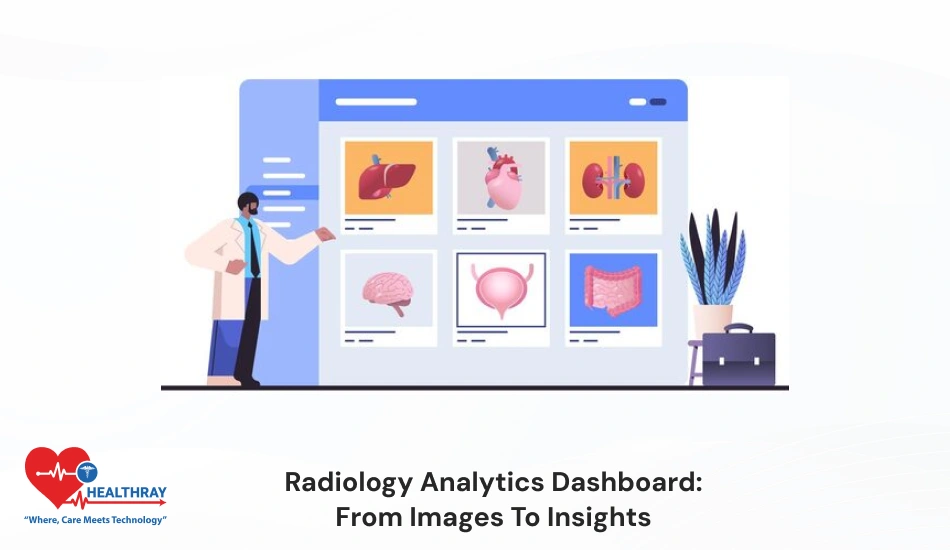AI is transforming the way hospitals function, and it’s no longer just about the buzz. From managing appointments to optimizing patient care, artificial intelligence is becoming a core element in healthcare systems. The benefits are far-reaching, with hospital management system administrators finding it easier to handle operations, IT professionals gaining innovative tools to improve efficiency, and health tech investors eyeing new growth opportunities.
This post delves into how AI reshapes Hospital Information Management System and what this means for different stakeholders. Along the way, you’ll discover how it’s cutting costs, saving time, and even saving lives. By the end, you’ll not only understand the technology but also have a clear picture of its practical benefits and challenges.
Enhancing Operational Efficiency with AI
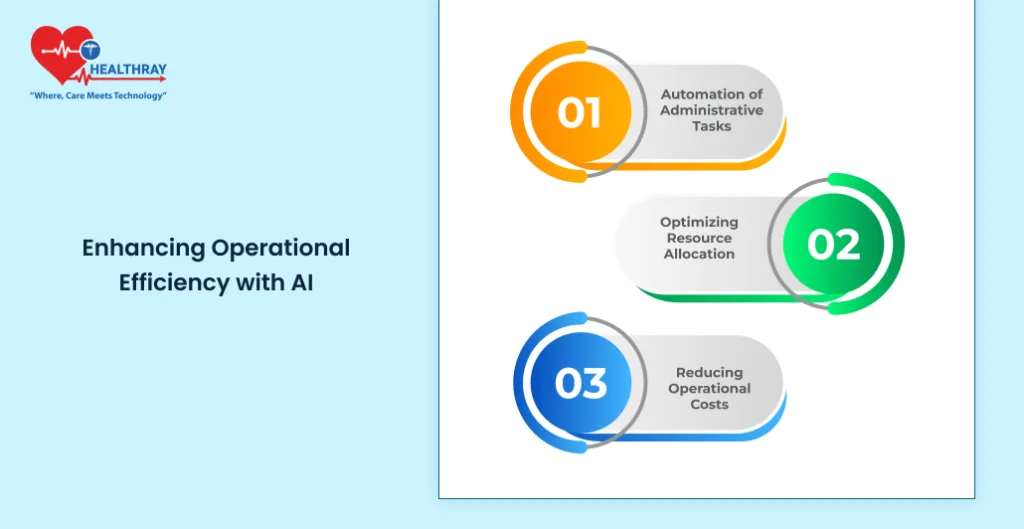
Automation of Administrative Tasks
Hospitals run on a flurry of administrative work, from scheduling appointments to managing patient records. AI steps in by automating repetitive tasks, like billing, claim processing, and appointment reminders. This not only saves time but also reduces errors, allowing staff to focus more on patient care.
Optimizing Resource Allocation
AI helps hospitals make smarter use of their resources. For example, predictive algorithms can analyze patient inflow patterns to adjust staffing levels. Hospitals can also manage inventory more efficiently by forecasting demand for medical supplies, ensuring they have just what’s needed—no more, no less.
Reducing Operational Costs
Streamlining operations will always have costs reduced. Hospitals, thereby, are able to focus funds on areas that really create patient outcomes. Additionally, AI insights reduce redundancy within the system, saving the overall money.
Improving Patient Care and Safety
Personalized Treatment Plans
AI brings a level of customization to healthcare that wasn’t possible before. By analyzing patient data, such as medical history and genetic profiles, AI systems help doctors design personalized treatment plans. This ensures patients get treatments tailored to their specific needs, increasing the likelihood of successful outcomes.
Predictive Analytics for Early Detection
This means that AI can analyze enormous amounts of data to find health risks before they turn critical. Predictive models can study symptoms, lab results, and even lifestyle factors to flag potential illnesses. Early detection improves the recovery rate and reduces the cost of treatments by attending to conditions before they escalate.
Real-Time Patient Monitoring
Wearable devices and AI-powered monitors keep an eye on patients around the clock. These tools alert healthcare providers to any irregularities, enabling faster interventions. Whether it’s detecting a sudden drop in vitals or notifying a nurse about medication timing, real-time monitoring ensures better safety and care.
Challenges and Risks of AI Integration
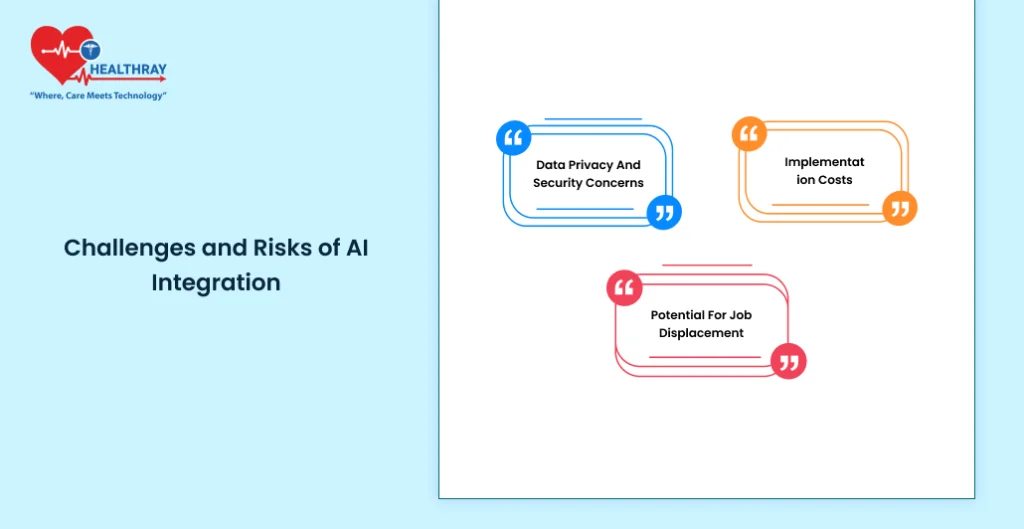
Data Privacy and Security Concerns
AI relies heavily on data to function effectively, but this raises questions about how that data is stored and used. Hospitals must ensure strict security measures to protect sensitive patient information. Any breaches could not only harm patients but also damage trust in AI systems.
Implementation Costs
AI systems are not cheap. Initial investments in software, hardware, and training can be substantial. Small healthcare facilities might not be able to implement such technologies without adequate funding, and thus affordability becomes a common concern.
Potential for Job Displacement
As AI automates more tasks, concerns about job displacement grow. Administrative staff and other roles could face redundancy as systems handle their responsibilities. However, this also opens opportunities for reskilling and creating new tech-focused roles within the healthcare sector.
Strategies for Effective AI Implementation
Conducting Thorough Needs Assessments
Before diving into AI adoption, hospitals must identify their specific needs. A detailed assessment helps prioritize areas where AI can make the most impact, such as patient care, resource management, or administrative efficiency. This ensures the investment aligns with organizational goals.
Choosing Scalable and Compatible Solutions
Not all AI systems fit every hospital’s infrastructure. Selecting solutions that are both scalable and compatible with existing technology will ensure smoother integration. Scalable systems also allow for growth, enabling hospitals to add features as their needs evolve.
Training Staff for Seamless Adoption
AI is only as effective as the people using it. Comprehensive training programs help staff understand and trust the technology. This minimizes resistance to change and ensures smooth day-to-day operations. Training also reduces the likelihood of errors when using AI tools.
Ethical Considerations in AI-Driven Hospital Management Systems
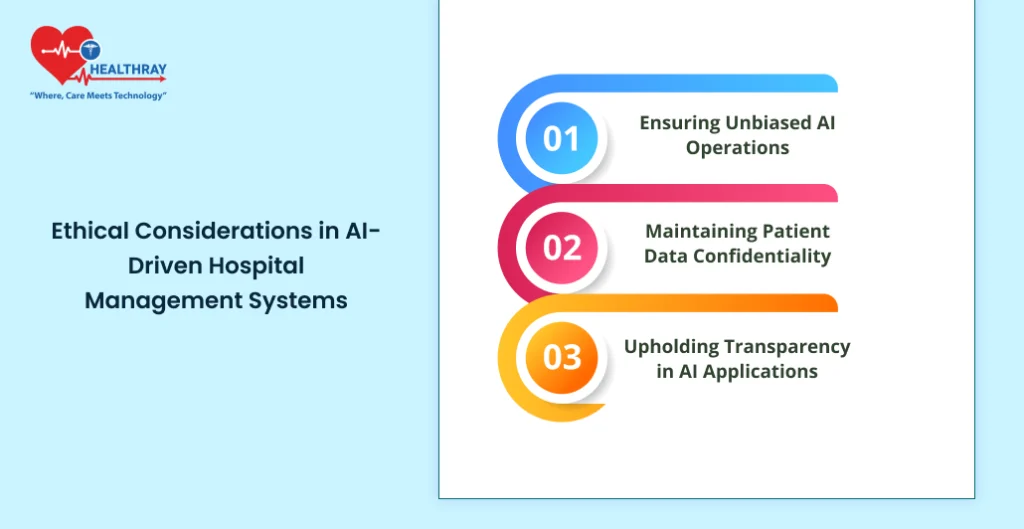
Ensuring Unbiased AI Operations
AI systems are only as unbiased as the data they are trained on. Hospitals must ensure that datasets are diverse and representative to avoid any form of discrimination. Regular audits can help identify and rectify biases in algorithms.
Maintaining Patient Data Confidentiality
AI relies heavily on patient data, making confidentiality a top priority. Hospitals must implement robust encryption methods and comply with data protection regulations to safeguard sensitive information. Transparency about how data is used also builds trust among patients.
Upholding Transparency in AI Applications
Hospitals must ensure clarity in how AI systems make decisions. For example, if an AI tool suggests a treatment plan, healthcare providers should be able to explain the reasoning behind it. Transparent AI builds trust and encourages wider adoption among both staff and patients.
Case Studies: Successful AI Integration
AI in Streamlining Patient Scheduling
A major hospital chain integrated an AI-powered scheduling tool to manage patient appointments. The system analyzed patterns in patient flow and resource availability, reducing wait times by 30%. Staff could focus more on patient interactions rather than logistics, enhancing overall satisfaction.
Predictive Analytics for Emergency Room Efficiency
An urban hospital applied predictive analytics to optimize its emergency room operations. The AI system predicted peak hours and patient needs based on historical data, allowing the hospital to allocate staff more effectively, reducing overcrowding in the ER and improving patient care during critical hours.
Improved Diagnostics with AI Assistance
A diagnostic center partnered with an AI company to improve the accuracy of medical imaging. Radiologists used AI tools to analyze X-rays and MRIs, which highlighted abnormalities that might have gone unnoticed. This increased diagnostic accuracy and allowed doctors to make better-informed decisions.
Future Trends in AI and Hospital Management
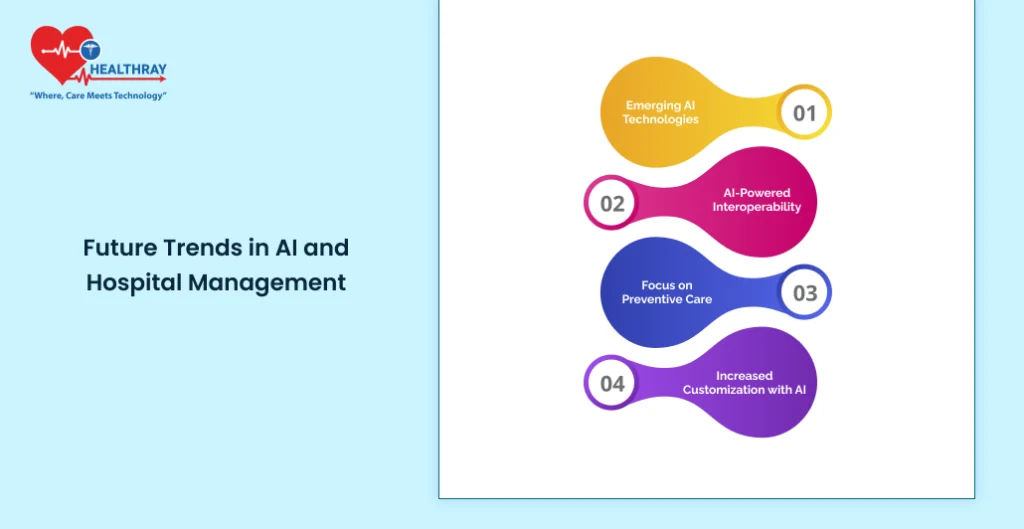
Emerging AI Technologies
Hospitals are beginning to adopt next-gen AI technologies, such as natural language processing for better patient communication and robotics for surgeries and rehabilitation. These innovations promise to redefine how care is delivered and managed.
AI-Powered Interoperability
The trend to integrate AI in health care for the integration of disparate systems is major. Using AI to unify patient records in a hospital can facilitate communication across departments and eliminate errors created by fragmented data.
Focus on Preventive Care
AI is driving a shift from reactive to preventive care. Tools like wearable health monitors and predictive analytics allow hospitals to address potential health issues before they require intensive treatment. This trend is set to reduce healthcare costs and improve patient outcomes significantly.
Increased Customization with AI
Personalized healthcare is gaining momentum. AI will continue to evolve, offering more precise insights tailored to individual patients. This could range from custom medication plans to advanced rehabilitation strategies designed for each patient’s unique needs.
Conclusion
AI is reshaping hospital information systems in profound ways. It enhances efficiency, improves patient care, and helps healthcare professionals make better decisions. While challenges like data privacy and implementation costs exist, strategies like proper planning, choosing scalable solutions, and robust staff training can address these concerns.
The future of healthcare is here, and AI is leading the way. AI presents great opportunities for hospital administrators, healthcare IT professionals, and investors. Embracing this technology not only boosts operational performance but also lays the groundwork for long-term success in a more technologically driven world.
